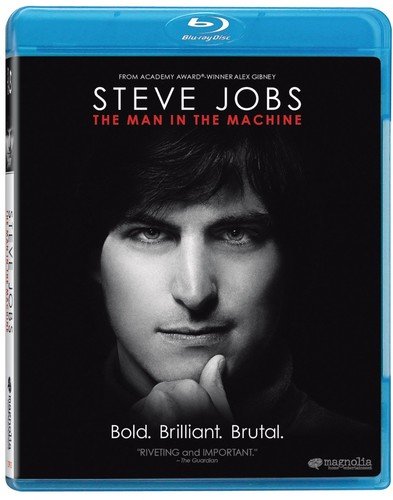
Written by Kristen Lopez
Steve Jobs has always been a hot commodity, but no more so than right now when not one but two films are casting an eye on the tech genius. Danny Boyle’s upcoming narrative on the Apple founder, starring Michael Fassbender, won’t hit theaters till October, but in the meantime there’s Alex Gibney’s documentary, Steve Jobs: The Man in the Machine. Touted as showing the “real” Steve Jobs, Gibney’s documentary is woefully underwhelming, particularly to anyone who’s read Walter Isaacson’s exhaustive, 656 page biography on the man.
Having just finished that book not two days ago, 90% of Gibney’s doc simply summarizes Jobs’ career, failing to produce anything not already common knowledge until the final 30 minutes. That final 30 minutes is interesting, and deserves a serious documentary, but Gibney’s research methods and manipulative storytelling make him no better than the man he’s casting aspersions against.
Gibney’s documentary sets out to answer the question of why the founder of an electronics company was eulogized with the fervor and grief of a nation mourning 9/11 or Princess Diana. Much of the implicit storytelling of The Man in the Machine focuses on Jobs as an innovator – a man who personalized a corporation as a means of selling products that have isolated us as opposed to unifying us. “It makes you wonder less about Apple and more about us,” says one commentor and that’s true. What does it say about us that we worship a man, and a company, spewing out $300 and up products that we supposedly can’t live without? In a week where PBS’ American Experience about Walt Disney is airing, The Man in the Machine acts as the antithesis when it isn’t.
But despite raising the question, Gibney fails to sufficiently answer it. Over 90 minutes of The Man in the Machine focuses on Jobs’ rise to power, the creation of the Apple, his troubled relationship and disowning of his first child, his return to Apple and its rise as a global conglomerate. All of this is explained in far greater depth in Walter Isaacson’s book, and for those who’ve read that Gibney’s documentary plays like a book report, summarizing every major life event in Jobs’ career with little fanfare or examination of it. There’s nothing gritty, shocking, or particularly revelatory, odd considering Gibney’s tone is meant to prove that the man wasn’t as mythic as he claimed; Isaacson’s book has more examples of Jobs being fickle, rude, and a bully than this does, and it has actual Apple employees stating it. The Man in the Machine is little more than a Wikipedia documentary.
It is the final thirty minutes in which Gibney actually stops mythologizing the man and presents any type of true negativity. After setting the scene, Gibney casts a dark veil over the notion that Apple is an American company when they actually send their money to Ireland as a means of getting tax breaks. He also spends time on the Chinese factories that create their products (remember the company that had to put out nets to keep the workers from committing suicide by jumping? Apple factory), and the death of an employee accused of stealing a prototype who, earlier, was beaten by police. There’s also a long discussion about Jobs’ attempts to sue and harass writers at Gizmodo who broke news of the new iPhone.
All of these are valid points that deserve more than being shoehorned into the final 40 minutes of the documentary. If one wants to answer the question of why we mythologize Jobs, skip over the reaons why know why we should and focus instead on why we shouldn’t. Unfortunately, Gibney’s bait and switch just seems like a political lobbyist saying “This guy’s awesome….but we have dirt,” and waiting till the votes are tallied to actually reveal it.
Gibney, at times, also ends up being just as manipulative as Jobs himself was through the use of crafty editing and music. A scene of a Senate subcommittee praising Apple for their American patriotism plays with loud Irish folk music over it before seguing into proving Apple keeps money offshore. The juxtaposition of the two scenes would have been enough, and stuck home the point that even our government is enamored by Apple; the addition of on the nose musical accompaniment – an issue that plagues the entire documentary – is the equivalent of a small kid pointing and saying, “See, I told ya so.”
Ultimately, The Man in the Machine doesn’t seem to believe we’ll find any fault with Jobs, and maybe that’s true. YouTube videos of random strangers crying and waxing poetic about Jobs sells the film’s point better than anyone: We want to be fooled by Steve Jobs. We allow ourselves to be consumed by brand identity. Had the documentary been straightforward, and not resorted to tactics Jobs himself would have used to woo us in the opposite direction, The Man in the Machine could have proven to us why Steve Jobs was, more than anything, a businessman.